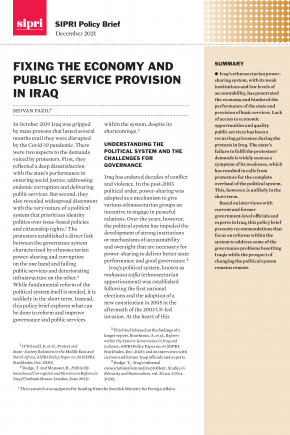Fixing the Economy and Public Service Provision in Iraq
Iraq’s ethnosectarian power-sharing system, with its weak institutions and low levels of accountability, has penetrated the economy and hindered the performance of the state and provision of basic services. Lack of access to economic opportunities and quality public services has been a recurring grievance during the protests in Iraq. The state’s failure to fulfil the protestors’ demands is a widely seen as a symptom of its weakness, which has resulted in calls from protestors for the complete overhaul of the political system. This, however, is unlikely in the short term.
Based on interviews with current and former government-level officials and experts in Iraq, this policy brief presents recommendations that focus on reforms within the system to address some of the governance problems besetting Iraqis while the prospect of changing the political system remains remote.
Understanding the political system and the challenges for governance
A struggling oil-dependent economy
The state of public services
Recommendations

